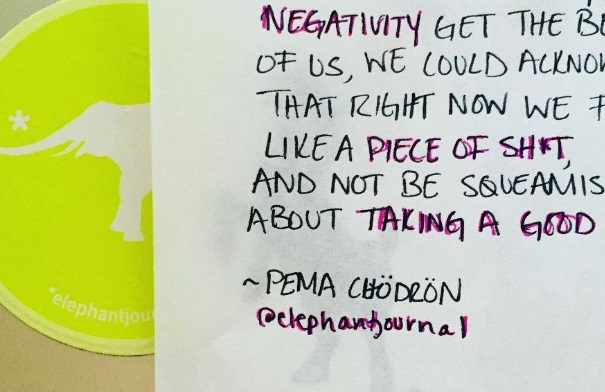![]()
Forgiving others has been a difficult task for me in the past.
Despite my strong desire to forgive someone and remove the burden from my shoulders, there was something missing from my process of forgiveness.
It took me years and a lot of self-reflection to realize that there was one stop I didn’t visit before reaching the other person’s station: myself.
I used to focus directly on the other person’s mistake and try to accept and forgive it. But when I failed to accept other people’s mistakes over and over again, I realized that I need to also accept my own mistakes as a starting point.
How can I possibly forgive others if I don’t forgive myself first?
I like to compare this process to planting. The pot should be well-prepared before planting the seeds, since it’s the environment in which the plant will grow. We should make holes in the bottom to allow water to drain freely. We must choose the potting mix, and the right soil, and so forth.
The same goes for forgiving others. Since forgiveness starts within us, we should fully prepare the environment in which forgiveness starts—which is ourselves. It is imperative to start the process of forgiveness from the inside out.
Everyone messes up. However, it’s usually easier to point a finger than to acknowledge our own mistakes. Since feeling guilt or shame feels awful, we try our best to brush our faults under the rug.
I know this feeling all too well. Guilt doesn’t feel good—but nonetheless, seeing our faults and taking responsibility for them helps us make peace with ourselves.
According to Buddhist philosophy, how we treat ourselves is how we treat others—and vice versa. Having said that, when we treat ourselves with compassion, we automatically tend to treat others the same way.
Here is some Buddhist guidance on how to forgive ourselves:
Acceptance.
When we do something wrong, we have two choices: change the situation or accept it. In Buddhism, this is referred to as right action and right view. If there is something we can do to change the course of things, we should take the right action or practice the right speech. We could apologize to who we have wronged and try to communicate with them. However, if we can’t change anything, we should practice right view, which means looking at the situation in a new light.
Non-acceptance often leads to feelings of guilt and frustration. We should accept that we are human beings with emotions that often lead us to ignorance. It is because of our ignorance that we might commit mistakes. But, if we shed light on our ignorance, we can transform it to wisdom and learn from our mistakes.
Impermanence.
All things are bound to end. When we do wrong, it’s beneficial to reflect on the notion of impermanence. With an understanding of the inevitable annihilation of all phenomena, we can take things less seriously.
Oftentimes, we beat ourselves up when something goes wrong due to our actions. According to Buddhist teachings, doing this is futile, because—eventually—things will go wrong. (The first Noble Truth is understanding that life is suffering.)
Remorse.
The Buddha understood that if we wish to clean up our karma, we should do it with a remorseful attitude. The intention is more important than the action. As a result, if we commit a mistake, but later truthfully regret it, we begin the process of forgiving ourselves.
Reflect on your mistakes on what happened. What could you have done or said that would not have harmed others? What action or reaction should you take next time? We should acknowledge where we went wrong and try to fix it in the future.
Don’t dwell on the past.
Often, we think if we dwell on the past and constantly analyze a situation, we might somehow solve it. The past is gone, but our minds keep it alive. Mentally revisiting a situation over and over again only causes us suffering—it doesn’t solve anything. Instead of holding on, we should practice letting go.
Shift your focus from dwelling on the mistakes to learning how not to repeat them in the future. We can’t go back to the past and change it, but we can certainly choose how to act (and react) in our present moment.
Meditate on it.
Meditation is a way to look inward and get to know what’s happening inside our minds. We can practice Metta Bhavana (which means to cultivate loving-kindness) or meditate on the situation that happened. Sit in meditation, take a few deep breaths, and mentally replay what happened. Don’t give yourself a hard time, but understand the impulse behind your actions, and let it go.
You can say things such as, “I forgive myself for doing this or that,” or “I understand why I reacted in this way, why I said this, or why I acted with ignorance.” Consider yourself a person you deeply respect and love, and be kind toward them.
Love yourself.
Last but not least, practice self-love. What does it mean to love yourself? To love oneself is a long, personal process and is associated with a variety of details. For me, loving myself mostly means to not allow anything or anyone to disturb my inner peace.
It means I treat myself with kindness, compassion, patience, and understanding. I consider myself a little baby who is prone to do something wrong at any moment. I’m always ready to forgive myself and let go of anything that might disturb my inner peace.
Accept yourself with your flaws and all, forgive yourself, and let go.
~
Relephant:
How to Forgive your Big, Horrible, Silly, Failing Self.
I’m Doing it For Me: The Art of Forgiving those Who Hurt Us.
~
Author: Elyane Youssef
Image: Instagram @elephantjournal
Editor: Yoli Ramazzina
Copy editor: Catherine Monkman
Social editor: Waylon Lewis








Read 1 comment and reply